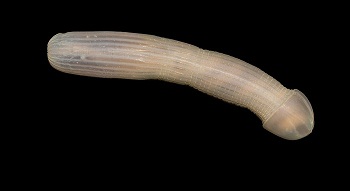
Researchers in Australia have discovered a new species of deep sea worm that resembles like a human penis, and lives in an abyss off of Australia’s eastern coast.
This weird creature was found by scientists from Museums Victoria during their recent expedition to the sea floor. According to scientists, this worm, when threatened, retracts its mushroom cap head into the shaft of its body and attains the shape of a peanut. Otherwise, it looks like a penis. These sipunculid worms make a group of unsegmented worms and there are about 320 different species of such worms lurking in deep sea.
Scientists from Museums Victoria recently came back after discovering a variety of marine creatures in the deep sea known as the eastern abyss. They uncovered a faceless fish, a sea pig, a zombie worm, flesh-eating crustacean, red coffinfish, giant sea spiders, a blob fish, a shortarse feelerfish, a cookie cutter shark, carnivorous sponges, a herd of sea pigs, a Ferrari-red crab, bioluminescent sea stars, tripodfish and many more microscopic critters. Recently, the team had posted the picture of the faceless fish found in the abyss, which became very popular.
“Australia’s deep sea environment is larger in size than the mainland, and until now, almost nothing was known about life on the abyssal plain,” Dr. Tim O’Hara, the expedition’s Chief Scientist and Museums Victoria’s Senior Curator of Marine Invertebrates, said.
We’re really excited about the discoveries that we’ve made and are thrilled that we can now share them with the Australian and international public,” Dr Tim O’Hara added.
During this expedition, the team also estimated the levels of pollution on the sea floor.
“We have found highly concerning levels of rubbish on the seafloor. We’re 100 kilometres off Australia’s coast, and have found PVC pipes, cans of paints, bottles, beer cans, woodchips, and other debris from the days when steamships plied our waters. The seafloor has 200 years of rubbish on it. Hopefully information such as this is the first step in influencing social attitudes towards rubbish disposal,” O’Hara said.